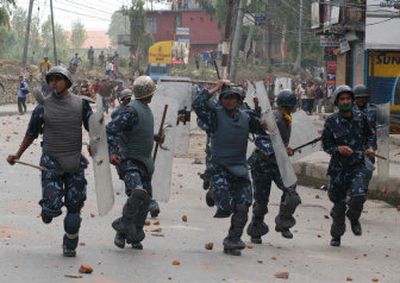Opposition protests intensify Nepal crisis

KATMANDU, Nepal – The crisis in this Himalayan nation deepened Sunday as angry crowds demanding the restoration of democracy took to the streets across Nepal in defiance of a daytime curfew, throwing stones at security forces and burning government offices.
With King Gyanendra and his swelling opposition both refusing to back down, the situation appeared to be reaching its most volatile point since he seized absolute power more than a year ago. The well-armed communist insurgency has allied itself with the political opposition, which vowed Sunday to continue demonstrations indefinitely. The government warned of harsher measures in response.
Security forces have killed three protesters, including one in Sunday’s gunfire, and thrown more than 800 in jail during four days of demonstrations that for the first time brought thousands of workers, professionals and business people into the streets alongside students and political activists.
“Even the parties didn’t expect such a massive public participation across the country,” said Lok Raj Baral, executive chairman of the Nepal Centre for Contemporary Studies and a retired diplomat.
Across the country and throughout the day, Nepalis protested in defiance of a daylight curfew and official orders to shoot violators on sight.
There were protests in at least four different parts of the capital, Katmandu. Some demonstrators threw stones at police before being forced back by tear gas. The private Kantipur television station broadcast footage of police shooting rubber-coated bullets, hitting at least one protester.
The station also showed protesters burning cars in Katmandu and looting city council buildings in a suburb.
The protests, part of a four-day nationwide strike, were to end Sunday, but the king’s opponents announced that they would continue indefinitely.
The Maoist rebels’ were supporting a strike by the political opposition for the first time, although the two sides struck an alliance late last year. The rebels’ leader, Prachanda, on Sunday announced a nationwide campaign to include defying curfew orders, blockading highways, breaking royal statues and punishing all those who pay taxes.
The demonstrations will be “long-drawn. I can’t say how this will end,” said Ram Sharan Mahat of the country’s largest party, the Nepali Congress, one of seven parties that have banded together to oppose Gyanendra. “The king must restore democracy,” he said.
Saturday was the 16th anniversary of the introduction of democracy in Nepal, which came about after dozens of pro-democracy demonstrators were shot by police, prompting a surge of anti-royal sentiment and forcing the late King Birendra to yield much of his authority.
Gyanendra abruptly ended the democratic experiment last year when he reclaimed absolute power from other parts of the government, arguing he needed to bring order to a chaotic and corrupt political scene and end a communist insurgency that has killed nearly 13,000 people in the past decade.
Many Nepalis at first welcomed the king’s move. But the insurgency has only worsened and the economy has faltered.